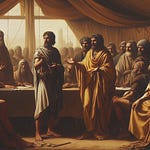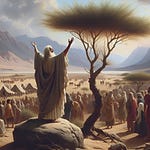Chapter Notes
Have you ever had the experience where you are more dedicated to God than ever, yet things seem to get worse?
In Exodus 5, Moses and Aaron must stand resolved through such a valley.
Commentary
vv. 1–9 - In obedience to God, Moses and Aaron have their first encounter with Pharaoh. With the support of the community elders, they are designated as representatives of the Hebrews. To expose the hostility, wickedness, and unreasonableness of Pharaoh, two things are notable regarding the initial request. First, it is for a temporary release from their burdens. Second, there is no threat of judgment declared upon the Egyptians, only upon the Hebrews, if they do not worship God. This was a test, and Pharaoh failed miserably. He immediately adds to the labor of the Hebrews, and although he declares them lazy and implies that he had indulged them by not tasking them sufficiently, I cannot help but think the real motivation for adding to their labor is found in v. 9, “let them not regard vain words.” Pharaoh saw Moses as a threat, and the very thought of liberty was a dangerous idea. The answer was to add more work so the people do not have time to share ideas that were dangerous to the status quo. Josephus remarks that “he made them to work hard at brick-making in the daytime, and to gather chaff at night.”
vv. 10–19 - The Hebrews are informed of the new arrangement. It must have been around harvest time because they seem to gather stubble that was left in the fields. When they cannot reach the quota, instead of beating all the Hebrews, the Egyptians beat the Hebrew officers overseeing the work under the Egyptian taskmasters. Implementing Hebrew management was a strategy to divide the Hebrews. With strategic employment of Hebrews, you could appoint the weak-willed who would afflict their brothers to save their own skin. But as soon as they received punishment for the lack of output, they go to Pharaoh to complain. But Pharaoh will not be moved.
vv. 20–23 - Upon leaving Pharaoh, the Hebrew officers turn their frustration on Moses and Aaron. They blame them, invoke God’s judgment upon them, express fear for their lives, and ultimately discourage the Lord’s servant, who wisely goes to God with his concerns and questions God’s Word because of the temporary setback they were experiencing.
Application
God commands all men to submit to His authority. We hear much today about human rights, but little emphasis is placed on divine rights. Yet, this chapter is not about the rights of the Hebrews; it is about the rights of God. Christian, contemplate both sides of this. This passage is an excellent illustration of Psalm 2, where kings are told to “kiss the Son.” However, God’s claim over the Hebrews was not just an encouragement. It came with a sense of duty. Since God claims me as His own, I must hand over the reins of my life to worship and obey Him. Do you live your life as if God is there for you, or you are here for God? Both are true, but the difference in emphasis changes everything about how you live and view your life.
The freedom that matters most is the freedom to worship God. Is there an ideal form of civil government? Are nations best governed as a constitutional monarchy or a republic? Different arguments may be given. While the history of the Church shows that she can survive and thrive in various contexts, the right to worship is a non-negotiable that results, inevitably, in civil disobedience. It is a willingness to put worship ahead of life itself, which is the mark of the genuine people of God. Many professing believers who do not bother with evening worship on the Lord’s Day when their team plays will either walk away from the Church or spiritually wake up when the government says they are forbidden from public worship. The public worship of God in days of liberty and persecution is the marker of the true Church. If you abandon the Church, you abandon your mother, and if you abandon your mother, you do not belong to the Father. Let it be understood, the man who diminishes the importance of public worship is guided by the same carnal mindedness as Pharaoh, and God will bring them and theirs into judgment.
The increase of material concerns is a Satanic strategy to destroy souls. This speaks for itself. Be careful of any extra business that draws you away from God. Satan loves to weaken souls and lead men into a period of backsliding through extra burdens. Be not ignorant of his devices.
Liberty depends on articulate resistance to tyranny. In general, man’s default position without the grace of God is tyranny. We can see this in the toddler’s nursery, the school playground, and anywhere where people either are assigned or assume authority. The one thing a tyrant hates more than anything, other than a superior force, is articulate resistance. Aside from implementing an unjust judicial system, the tyrant will intentionally embrace a deficient education system for the masses. This is why socialism gravitates to tyranny, because it flattens education and makes resistance predictable and impotent. The tyrant cannot exist where there is a marriage of sufficient courage and superior education. Parents, take your child’s education seriously. They will either become sons to resist tyranny or daughters raising sons who resist tyranny. Either way, their education in history and instruction in virtue are vital.
The temptation to unbelief is strong in times of affliction. The response of the Hebrew officers towards Moses and Aaron shows how important it is for leaders to possess a clear word from God regarding their objectives. To his credit, when discouraged, Moses turned to God in prayer. Although God promised deliverance, He also had said “the king of Egypt will not let you go” (Ex. 3:19). In addition, all the Hebrews ought to have known the history of the patriarchs and the delays faced by Abraham and Isaac when desiring offspring to fulfill God’s promises. Dear believer, do not live by what you see and feel, but live by the promises of God. God has never failed to keep a promise. Keeping this in mind is the best suppressant to faithless discontentment.
Without Christ’s redemptive work, the burden of obedience is impossible to bear. Are you still trying to live to gain entrance into heaven by your own goodness? There is a significant emphasis in this chapter on work, with multiple terms used: work, burdens, labor, tasks, make bricks, etc. This is the position of all men before they experience a spiritual exodus from the bondage of sin and the tyranny of Satan. It is only in Christ, having experienced His delivering grace by faith alone, that we are enabled to live without the crushing sense of trying to live holy enough for God to accept us. By faith, we rest from our own labors and accept the sufficiency of Christ. This is the gospel. Do you believe it?
“Brick-making, brick-making, brick-making—that is Pharaoh’s joy, and so it is with the sinner before he is renewed—money-making, dirt-making, heaping together to himself bricks that he may build for himself a fortune. Oh! don’t these fellows turn round and look with supreme contempt on us poor fellows, that we should think that eternity is better than time, that God is better than the devil, that holiness is better than sin, that the pleasures of heaven are better than the poor pomps and vanities of this world.” — Charles Spurgeon











